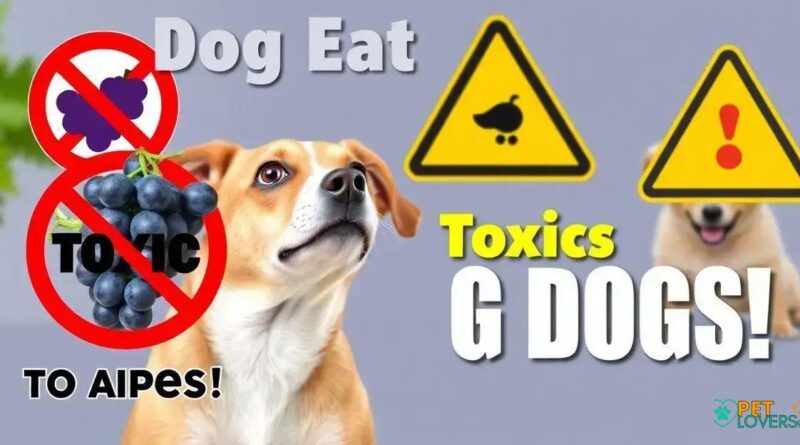Can Dog Eat Grapes? The Surprising Truth Revealed
Grapes are toxic to dogs due to a compound called tartaric acid, which can lead to kidney damage and failure, especially in puppies. Even small amounts can be harmful, so it’s crucial to store grapes securely, supervise your dog, and seek immediate veterinary help if ingestion occurs.
Are you wondering can dog eat grapes without worrying about your pet’s health? The answer may surprise you. Grapes are a staple in many human diets, but they can be deadly to dogs. In fact, consuming even a small amount of grapes can lead to severe health issues and even kidney failure in some cases.
In this article, we’ll delve into the reasons why grapes are toxic to dogs, the potential risks involved, and what you can do to keep your furry friend safe.
Why Grapes Are Toxic to Dogs
Grapes, both red and green, contain a toxic compound called tartaric acid, which is responsible for the destruction of a dog’s kidneys. The exact mechanism of this toxic reaction is not fully understood, but it’s believed that the acid reacts with the dog’s kidneys, leading to damage and eventual failure. This toxicity is specific to grapes and not found in other fruits or vegetables. Prolonged consumption of grapes can lead to severe health issues, including kidney failure, and in some cases, even be fatal.
While the exact amount of grapes that can cause harm to a dog is unknown, it’s essential to understand that even a small quantity can lead to adverse effects. The risk is higher for dogs that are already prone to kidney disease or have a history of kidney issues. In addition to kidney damage, grape consumption can also cause vomiting, diarrhea, and abdominal pain. If you suspect your dog has eaten grapes, it’s crucial to seek immediate veterinary attention to prevent further complications.
Puppies are especially vulnerable to the toxic effects of grapes due to their developing kidneys. Even a small amount of grapes can cause severe harm to a puppy’s kidneys, leading to long-term damage and potential kidney failure. As a responsible pet owner, it’s essential to keep grapes and other toxic substances out of reach of your puppy to ensure their safety and well-being.
To prevent accidental grape consumption, it’s crucial to store grapes in a secure location that’s inaccessible to your dog. Keep them in airtight containers or zip-top bags, and avoid leaving them on countertops or tables. It’s also essential to supervise your dog during meals and snack times to ensure they’re not getting into any grapes or other toxic substances. By taking these precautions, you can significantly reduce the risk of grape toxicity in your furry friend.
The Dangers of Grape Consumption in Dogs
The consumption of grapes by dogs can lead to severe health issues, including kidney damage and failure. The exact mechanism of this toxic reaction is not fully understood, but it’s believed that the tartaric acid in grapes reacts with the dog’s kidneys, causing damage and eventual failure. This toxicity is specific to grapes and not found in other fruits or vegetables. The risk of grape toxicity is higher for dogs with pre-existing kidney disease or a history of kidney issues. Even a small amount of grapes can cause harm, making it essential to keep them out of reach of your furry friend.
Puppies are especially vulnerable to the toxic effects of grapes due to their developing kidneys. Even a small amount of grapes can cause severe harm to a puppy’s kidneys, leading to long-term damage and potential kidney failure. As a responsible pet owner, it’s essential to keep grapes and other toxic substances out of reach of your puppy to ensure their safety and well-being.
To prevent accidental grape consumption, it’s crucial to store grapes in a secure location that’s inaccessible to your dog. Keep them in airtight containers or zip-top bags, and avoid leaving them on countertops or tables. It’s also essential to supervise your dog during meals and snack times to ensure they’re not getting into any grapes or other toxic substances. By taking these precautions, you can significantly reduce the risk of grape toxicity in your furry friend.
Can Puppies Eat Grapes?
Puppies are especially vulnerable to the toxic effects of grapes due to their developing kidneys. Even a small amount of grapes can cause severe harm to a puppy’s kidneys, leading to long-term damage and potential kidney failure.
As a responsible pet owner, it’s essential to keep grapes and other toxic substances out of reach of your puppy to ensure their safety and well-being. Puppies are naturally curious, and their small size makes them more susceptible to accidental ingestion.
It’s crucial to supervise your puppy at all times and take necessary precautions to prevent grape consumption.
How to Keep Grapes Out of Reach of Your Dog
To prevent accidental grape consumption, it’s essential to store grapes in a secure location that’s inaccessible to your dog. Keep them in airtight containers or zip-top bags, and avoid leaving them on countertops or tables.
It’s also crucial to supervise your dog during meals and snack times to ensure they’re not getting into any grapes or other toxic substances. Additionally, consider using baby gates or pet barriers to block access to areas where grapes are stored.
By taking these precautions, you can significantly reduce the risk of grape toxicity in your furry friend.
Conclusion: The Importance of Grape Safety for Dogs
Grapes are a popular snack for many people, but it’s important to understand that they can be toxic to dogs. Even small amounts of grapes or raisins can lead to serious health issues in dogs, including kidney failure.
As a pet owner, you should be aware of the signs of grape toxicity, which may include vomiting, diarrhea, lethargy, and loss of appetite. If you suspect your dog has ingested grapes, it is crucial to contact your veterinarian immediately.
Understanding Grape Toxicity
The exact substance in grapes that causes toxicity in dogs is still unknown, but the effects can be severe. Some dogs may be more sensitive to grapes than others, and there is no established safe amount.
Preventing access to grapes and educating others about the dangers can help keep your furry friends safe. Always be cautious about what foods are accessible to your pets.
Maintaining grape safety for your dogs requires a combination of education, vigilance, and proactive measures.
By understanding the dangers of grape consumption, taking steps to prevent accidental ingestion, and being aware of the symptoms of grape toxicity, you can help ensure the health and well-being of your furry friends.
Shared Responsibility
Remember, grape safety is a shared responsibility between pet owners, veterinarians, and the community as a whole.
By working together, we can promote a safer and healthier environment for our dogs.
Frequently Asked Questions about Grape Safety for Dogs
Why are grapes toxic to dogs?
Grapes contain a toxic compound called tartaric acid, which can cause kidney damage and failure in dogs.
Can puppies eat grapes?
No, puppies are especially vulnerable to the toxic effects of grapes due to their developing kidneys.
How can I keep grapes out of reach of my dog?
Store grapes in a secure location, keep them in airtight containers or zip-top bags, and avoid leaving them on countertops or tables.
What are the symptoms of grape toxicity in dogs?
Symptoms can include vomiting, diarrhea, lethargy, and abdominal pain, and can progress to kidney failure if left untreated.
Can I still give my dog grapes if they are not toxic?
No, it’s still not recommended to give your dog grapes, even if they are not toxic, as they can cause gastrointestinal upset and other health issues.
How can I prevent my dog from eating grapes?
Supervise your dog at all times, keep grapes out of reach, and consider using baby gates or pet barriers to block access to areas where grapes are stored.





